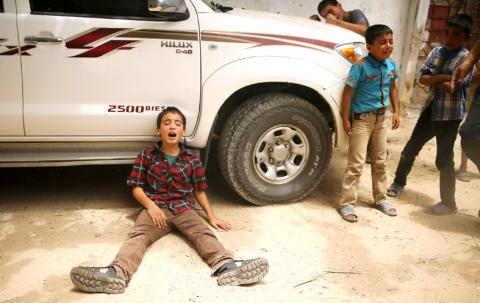Israeli strikes on Gaza killed a teenager and a woman yesterday, medics said, raising the overall death toll to 166 as the punishing air campaign entered its sixth day.
One strike on the northern town of Jabaliya struck a house, killing a 14-year-old boy, emergency services spokesman Ashraf al-Qudra said.
Shortly afterward, another strike killed a woman in the Maghazi refugee camp in central Gaza, he said. A man was killed in a raid on Beit Hanun in northern Gaza, where the Israeli army has warned it will sharply escalate its offensive and has urged residents to flee.

Photo: Reuters
Elsewhere, another person died from injuries sustained in an earlier strike, Qudra said, giving an overall death toll of 166.
More than 1,000 people have been wounded, he added.
Witnesses in the southern city of Rafah also reported seeing gunmen killing a man in the middle of the street in what appeared to be the execution of someone suspected of collaborating with Israel. There was no immediate claim of responsibility from any of Gaza’s armed factions.
Neither Israeli nor Palestinian militants show signs of agreeing to a ceasefire, despite calls by the UN Security Council and others to end the increasingly bloody six-day-long offensive. With Israel massing tanks and soldiers at Gaza’s borders, some fear that could signal a wider ground offensive and heavy casualties.
“We don’t know when the operation will end,” Israeli Prime Minister Benjamin Netanyahu told a Cabinet meeting yesterday. “It might take a long time.”
Early yesterday, Israeli troops launched a brief raid into northern Gaza to destroy what Jerusalem described as a rocket launchsite, an operation the military said left four soldiers slightly wounded.
The Israeli Air Force later dropped leaflets warning residents to evacuate their homes ahead of what an Israeli military spokesman described as a “short and temporary” campaign against northern Gaza to begin after 12pm. The area is home to at least 100,000 people.
It was not clear whether the attack would be confined to stepped-up airstrikes or whether it might include a sizeable ground offensive — something that Israel has so far been reluctant to undertake.
As the ultimatum drew near, hundreds fled Beit Lahiya, one of the communities the Israeli announcement affected. Some raced by in pickup trucks, waving white flags.
“They are sending warning messages,” Gaza resident Mohammad Abu Halemah said.
“Once we received the message, we felt scared to stay in our homes. We want to leave,” he added.
Yesterday, Palestinians with foreign passports began leaving Gaza through the Erez border crossing. Israel, which is cooperating in the evacuation, says 800 Palestinians living in Gaza have passports from countries including Australia, the UK and the US.
US citizen Ahmed Mohana said he had mixed feelings about leaving friends and family behind in the troubled Gaza Strip.
“It is very hard, it is very tough,” he said. “We are leaving our family, our relatives and brothers and sisters in this horrible situation — we have to do what we have to do.”

MAKING WAVES: China’s maritime militia could become a nontraditional threat in war, clogging up shipping lanes to prevent US or Japanese intervention, a report said About 1,900 Chinese ships flying flags of convenience and fishing vessels that participated in China’s military exercises around Taiwan last month and in January have been listed for monitoring, Coast Guard Administration (CGA) Deputy Director-General Hsieh Ching-chin (謝慶欽) said yesterday. Following amendments to the Commercial Port Act (商港法) and the Law of Ships (船舶法) last month, the CGA can designate possible berthing areas or deny ports of call for vessels suspected of loitering around areas where undersea cables can be accessed, Oceans Affairs Council Minister Kuan Bi-ling (管碧玲) said. The list of suspected ships, originally 300, had risen to about 1,900 as

DAREDEVIL: Honnold said it had always been a dream of his to climb Taipei 101, while a Netflix producer said the skyscraper was ‘a real icon of this country’ US climber Alex Honnold yesterday took on Taiwan’s tallest building, becoming the first person to scale Taipei 101 without a rope, harness or safety net. Hundreds of spectators gathered at the base of the 101-story skyscraper to watch Honnold, 40, embark on his daredevil feat, which was also broadcast live on Netflix. Dressed in a red T-shirt and yellow custom-made climbing shoes, Honnold swiftly moved up the southeast face of the glass and steel building. At one point, he stepped onto a platform midway up to wave down at fans and onlookers who were taking photos. People watching from inside

Japan’s strategic alliance with the US would collapse if Tokyo were to turn away from a conflict in Taiwan, Japanese Prime Minister Sanae Takaichi said yesterday, but distanced herself from previous comments that suggested a possible military response in such an event. Takaichi expressed her latest views on a nationally broadcast TV program late on Monday, where an opposition party leader criticized her for igniting tensions with China with the earlier remarks. Ties between Japan and China have sunk to the worst level in years after Takaichi said in November that a hypothetical Chinese attack on Taiwan could bring about a Japanese

The WHO ignored early COVID-19 warnings from Taiwan, US Deputy Secretary of Health and Human Services Jim O’Neill said on Friday, as part of justification for Washington withdrawing from the global health body. US Secretary of State Marco Rubio on Thursday said that the US was pulling out of the UN agency, as it failed to fulfill its responsibilities during the COVID-19 pandemic. The WHO “ignored early COVID warnings from Taiwan in 2019 by pretending Taiwan did not exist, O’Neill wrote on X on Friday, Taiwan time. “It ignored rigorous science and promoted lockdowns.” The US will “continue international coordination on infectious